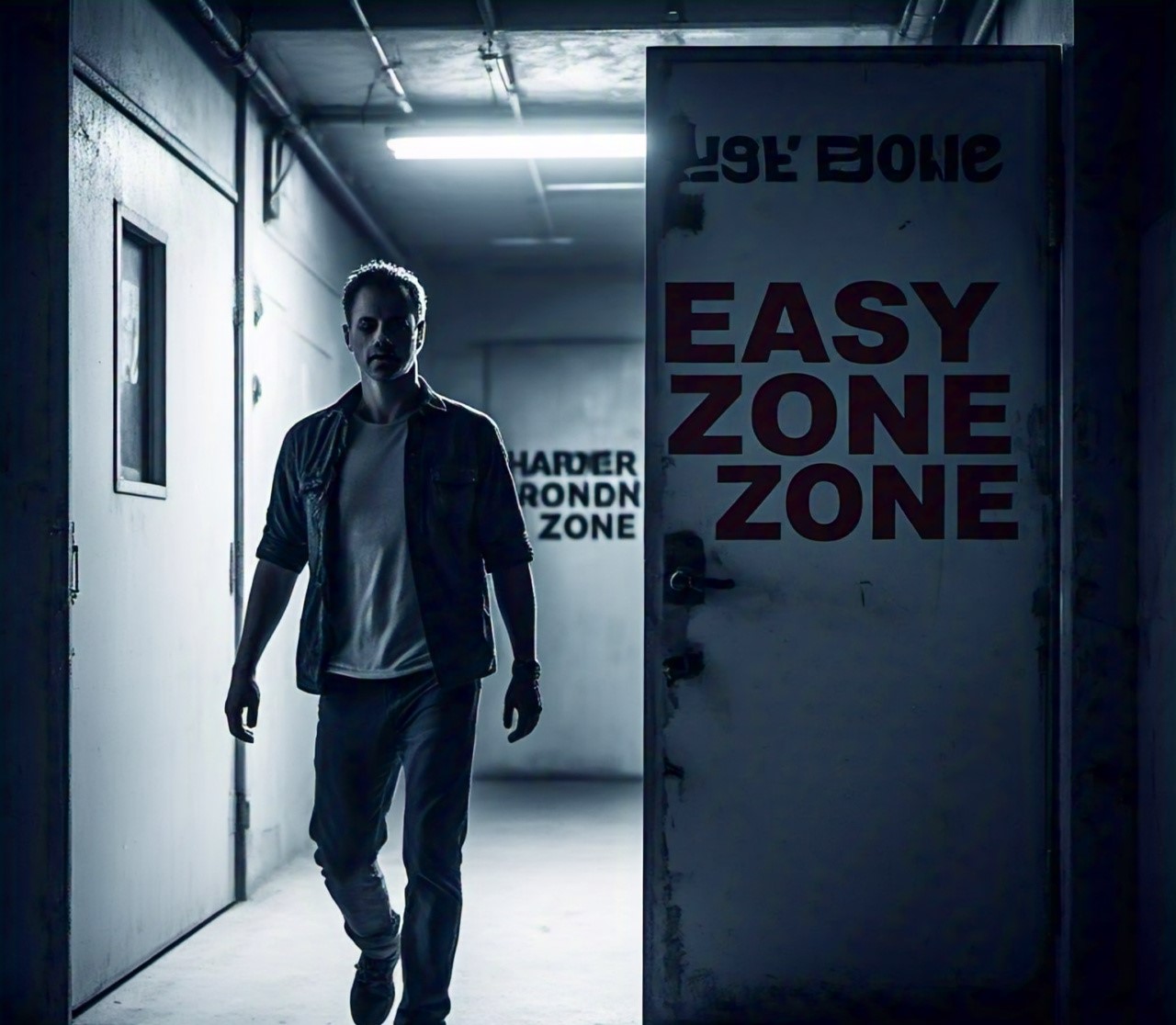In our comfort zone, it feels secure and comfortable and finding the desire to leave can be a challenge. However, the longer we stay in our comfort zone, the more opportunities are lost to experience life and make the most of it.
If the feeling of peace in our comfort zone indicates our basic needs are being met, why would we want to leave it?
What often keeps people from progressing is their mental state, not ignorance.
Stepping out and beyond your comfort zone requires willpower and a change in how you think. Every move you make to step out of your comfort zone can lead to personal growth, education, and success.
What is The Comfort Zone?
The comfort zone is a mental condition in which an individual is at ease since they’re not being tested.
Within the comfort zone, people rarely explore new things or face any difficulties. They are only involved in activities that they are used to, which makes them believe that they are in control of their surroundings.
Most people remain within their comfort zones to prevent feelings of anxiety, pain, stress, and tension. Anything outside of our comfort zone causes uncertainty, making us nervous. Human beings are naturally wired to stay away from these emotions. This is why they are uneasy about stepping out of their comfort zone.
As cozy as it may seem, this safe bubble prevents people from advancing their personal lives and doing what they would like but don’t want to pursue.
As an example, settling into an unfulfilling position for a long time can leave you feeling exhausted and unengaged. Yet, it’s become your comfort zone. You’re confident that you can do more, but the idea of venturing beyond your comfort zone and challenging your limits is scary because it entails an element of uncertainty.

What is The Comfort Zone in Psychology?
The comfortable zone is a psychological state in which a person is in a state of anxiety neutral with a restricted range of actions to provide an unwavering degree of performance with no feeling of risk.
In the comfort zone, there’s not much motivation for individuals to achieve new levels of performance. In this environment, individuals go about their routines without a sense of risk, which causes their progress to stagnate.
Why is it hard to Step Out of Your Comfort Zone?
Finding the motivation to leave your comfort zone can sometimes be challenging. You might be reluctant to take that first step for a few reasons:
The attraction of the comfort
We can desire to grow; however, the pull of the comfort zones is always strong. Since it’s safe and comfortable to live in, it’s easy for us to want to stay in that zone.
However, staying in the same place is also a sign of not going forward and becoming. Growth and comfort cannot be on the same horse. We tend to overlook the dangers of not taking risks and not taking chances. Also, you could miss an opportunity to experience the lifestyle that you can live.
Uncertainty and fear
In your home, In your comfort zone, everything is predictable, which makes you feel secure. For instance, you are aware of almost exactly what to expect when using the identical route to work each day.
If you are considering moving out of or extending your home base, you’re faced with the fear of uncertainty. And according to Psychology Today, uncertainty is synonymous with risk, which can make you feel fearful.
Even if you realize you’ve grown out of your space, fears can keep you from taking the next step. You might be hesitant to take a new career option due to fear of failing.
A fixed-minded mindset
If you’re stuck in perspective and believe you don’t possess the abilities to accomplish something new or more, this causes you to be less eager to find opportunities to learn and grow new abilities.
Instead, you stay within your familiar zone by making statements such as I can’t do that, or That’s not something I’m proficient at.
This attitude keeps you in your comfort zone in order to stay away from challenges and difficulties.
Contrary to popular belief, open-mindedness doesn’t mean being stupid. It’s about being intelligent, not stupid.
Close-mindedness can drain your life, but you have the power to change it. Open-mindedness can help you change your outlook and the perspectives of those around you who are close-minded.
It’s not just a magical quality to be open-minded.
Being open-minded means being open to all ideas, arguments, information, and other perspectives. Open-mindedness is generally considered to be a positive quality. This is necessary to think rationally and critically.
It doesn’t necessarily mean being open-minded will be easy. Openness to new ideas and experiences can lead to confusion and cognitive dissonance when new information contradicts existing beliefs. Learning and personal growth are made possible by modifying and revising incorrect beliefs.
Continue Reading: [Fixed] How to Be an Open-Minded Person
Fixed habits
Change in behaviour is challenging due to the fact that our behaviour is a habit. We are more likely to become stuck in fixed patterns as we repeat the same behaviour patterns.
For instance, getting up at 6 a.m. daily will be difficult initially, especially If you’ve had an unscheduled sleep schedule for a long time.
Behaviour change that lasts is based on an openness to making changes.
The pros of staying in your comfort zone include:
Minimizing risk
When you perform tasks within your comfort zone, you are aware of the risks and can minimize them. Routine tasks are generally more secure than unfamiliar ones.
Drawing on experience
If you remain in your familiar zone, you participate in routine activities. You complete tasks that you’ve done many times and probably with an established history of achievement. Being comfortable lets you draw upon the experiences you’ve gained from previous performance in areas you’re likely to know.
Being confident
Although new experiences can trigger anxiety and hesitation, remaining within one’s comfort zone boosts confidence and reduces anxiety. If you’ve been successful previously with an assignment, it helps build confidence and a healthy confidence level when you tackle similar tasks to come.
Rejuvenating
If you’ve stretched yourself out of your normal boundaries and comfort zone, resuming your normal zone can allow you to re-energize and mentally recover before returning to more stressful and uncertain scenarios.
Utilizing less energy for routine tasks
If an activity falls within your comfort zone, you’ll most likely be able to accomplish it quickly and efficiently without much thought or planning. The ease of doing routine tasks gives you more time and energy to tackle more challenging tasks.
In all likelihood, there are plenty of compelling reasons to remain in your comfort zone, but breaking free from these shackles can be appealing.
Why You should Step Out of Your Comfort Zone
Being comfortable in your zone has obvious benefits, including less anxiety, stress and general happiness. However, it could cause you to feel that you’re trapped in a pattern of holding. It’s because growth and uncertainty growth are equally human needs; there’s a paradox here: Too much certainty, and we’ll not be able to satisfy our desire for growth and experiences that are new. However, too much uncertainty could result in anxiety and loss of effectiveness.
The ability to step out and beyond your comfort zone regularly in positive ways helps you achieve the ideal equilibrium between uncertainty and certainty. There are many reasons to do this:
There is no better way to grow
Push yourself, and you’ll expand; It’s great!
Experiences and new challenges alter the brain’s wiring, making it more flexible, healthy, stronger, and powerful and boosting confidence in yourself.
It won’t be as bad as you expect
As long as you are prudent in your reasoning, determined and willing to do the work, it won’t be as bad as you think; you’ll enjoy the process.
Egos heal
There are no bones to break in an ego, how long yours takes to heal depends only on your attitude.
You’ll be proud to have taken this leap. Everyone stands higher with the joy of a new achievement. It is possible to achieve that much more often than you do today.
The ego is an integral part of human development; the ego can benefit us by giving us confidence and motivating us to conquer the world.
As we become adults and take care of our lives, our egos can be a hindrance to our success.
The idea of “letting go of your ego” was something I came across years ago. It sounded appealing to me.
One of the focuses of my growth was to get rid of my ego. It is difficult to find someone who doesn’t love the joy of a child’s smile, innocence, and honesty.
It is liberating to watch them lose themselves in something that they love. It’s something I have found that many people avoid when they reach adulthood. I believe the main reason is to keep themselves safe from getting hurt; this is, in retrospect, more of a sign of weakness than strength.
Continue Reading: Let Go of Your Ego And Live A Better Life
Other people are anxious too
When you’re nervous or anxious, you may feel isolated and alone. It’s not alone.
People with no skill and more fear than you are doing what you are trying to avoid.
No one is paying that much attention to you
When you feel worried or anxious, it’s as if all the world is watching, but they aren’t.
You might discover something you love
Seriously, Think about all the things you’ve not attempted. What’s not to love? Plenty of exciting activities on that list!
You will be more promotable or will earn more money
The ones who are willing to take on new challenges and risks gain respect and promotion. Independent professionals need to take on personal risks to earn more money.
Each milestone makes it easier to tackle another milestone
You’ll be more resilient and better prepared to face any challenge that may come to you.
Events can occur that take you out of your comfort zone. The more open you are towards new opportunities, the more varied your experiences are; the more confident you are about your ability to handle new situations and challenges, the more resilient you’ll become.
Your new experiences can make a difference in how you think about, what you enjoy doing, and how you conduct yourself and live your life. The possibilities are endless.
The cons of staying in your comfort zone include the following:
If you remain in your comfortable zone for long enough, it could cause you to become complacent. If you do not engage in things that make you uncomfortable or challenging, you are missing out on opportunities to grow. In the field of physics, Isaac Newton’s First Law of Motion dictates that a body at rest will remain at rest unless an outside force acts on it, and a body in motion will remain in motion unless acted upon by an external force. Translated to comfort zones: You can’t make progress by keeping still.
No risk, no reward
It could be a phrase that is overused; However, it’s a good one: Nothing ventured, nothing gained. If you don’t attempt something new, you’ll never be successful at anything new. The biggest rewards are for those who take risks, even if they’re not big.
Do not learn new skills
When you take risks, you build new abilities, learn new skills and work on improving your strength and reducing your weaknesses.
Missing the opportunity to make your comfort zone bigger
One of the most vital reasons to step out and go beyond your comfort zone is to expand the boundaries of your comfort zone. If you are willing to take risks, accept some uncertainty and discomfort and overcome them, you increase your overall skill set and boost your confidence. The more you attempt complex tasks, the more common these tasks become, expanding your comfort zone and allowing you to take on larger and greater dimensions.
How to Step Out of Your Comfort Zone
There’s hardly any space for excitement and adventure within your current comfort zone. To add some spice to your day and enjoy the personal growth you’ve always wanted, it’s crucial to experiment with new (sometimes terrifying) things. Stretch your limits! Moving outside your comfort zone might be difficult initially, but tackling new challenges will make you more content in the long run.
Find your base
To step beyond your comfortable zone, you must establish the risk you are willing to take. Many people think that they’re more tolerant of risk than they really are, and many people don’t have a clear idea of their risk tolerance as they’ve never had to face extreme situations in tests. To determine your baseline, you must determine your primary motivation. If your primary human need is security or connection, you may require stepping out of your comfort zones more often or regularly.
Create an attitude of growth
Growth is among the essential human necessities. People who are the most prosperous globally have a profound need for improvement that drives them out of their comfort zones to explore new opportunities. This is referred to as having a growth mindset, believing that people have the ability to enhance their abilities. Contrary to this, those with a fixed view of life don’t think they can develop themselves and don’t attempt to. If you can develop a growth mindset, it will allow you to access the power within you.
You can test yourself each day in small ways
Find ways to get out of your routine by taking a few steps. Once you’ve taken the step of putting yourself out of your normal routine, it will be much easier to take on larger challenges.
Do everyday things differently
In everyday life, there are plenty of chances to test yourself. Put your smartphone away and put off the TV when working or having dinner; choose what to wear faster or slow down to enjoy the scenery while walking. Cold showers, getting up early, starting the book you’ve always wanted to read. What things are making you feel uncomfortable? Listing things you’re not used to is an excellent way to imagine what you could accomplish.
Do something you’ve always wanted to do
If you’ve got a long list of activities you’ve wanted to accomplish but have yet to get started, you should.
You can challenge yourself by choosing something you’ve always wished to accomplish and completing it.
Do not give yourself an out
You can tell yourself that you will try this new activity; if you don’t, you take away any other routine you enjoy. You might want to attend an upcoming class, but you’re anxious. In reality, you worry that you won’t enjoy the entire class or even make it through. Make yourself aware that you must complete the course to be permitted to watch the latest episode of your favourite television show.
- You don’t have to continue if you really don’t like it. Try it at least once before you can decide for yourself whether or not.
- The consequences of your ultimatum must be primarily psychological. If you’re having a hard time, be specific.
Come up with a reason (or a few)
You should think about what you’re likely to gain from the new experience. When you’ve got your answers, write them in your notebook; return to them whenever you want to stop. This could help remind you of the reason you initially desired to leave your comfort zone and increase your motivation.
- Perhaps you’re considering moving to a new place however you’re worried that you’ll be missing the people and families from your home town. You should remember why you decided to move to a new city, like better job opportunities and the chance to make new acquaintances.
Be in control of your emotions
People who are able to quickly leave their comfort zones may possess more emotional control than those who remain in routines. This doesn’t mean they suppress their emotions. Actually, they are doing the exact opposite. They realize that their feelings serve as a guide for them. They fully feel their emotions and ask, “What does this feeling really saying to me?” When you leave your comfort zone, anxiety is normal. It’s a sign that you’re feeling vulnerable. Accept it, and then let it go.
Do you know that there are thousands of decisions we make every day? Average adults face a multitude of decisions every day, from what to eat, what to buy, where to shop, and what to post online, it is often difficult to make the right choice because of this. It’s not the overwhelming number of choices that are scary. It’s the possibility of making the wrong decision.
Do not let your anxiety level fool you into believing that it is the factor that will help you decide about risk. You may not be able to trust your feelings. Your thoughts will not be as logical if you feel more emotion than normal. To balance your emotional reactions, increase your rational thinking about the risk.
Are there any right ways to make better decisions in your life and at work? How important is emotion in decision-making? Are we able to control our emotions in order to achieve the desired results?
Continue Reading: Do Not Let Your Emotions Cloud Your Judgement
Try a fitness exercise
Try 30 days of fitness challenges like cycling or running. The challenges to your fitness will not only expand your comfort zone, but they can also boost fitness levels and health and overall well-being.
Studies have shown that exercising regularly reduces stress’s impact on your body and lowers anxiety levels. This allows you to explore things that are not in your comfort zone, as one of the biggest obstacles to breaking out is the fear it causes.
Enhance your professional skills
Comfort zones can hinder your professional development. If you’re too comfortable with an area, it could impede your progress in a position and professional career.
One way to get out of your comfort zone is to acquire new skills that will give you a competitive edge and help you become more employable. Utilize your company’s training and development resources to enhance your abilities in your industry.
Learn and master a new skill
If you are willing to try something new, you’re entering the realm of learning! Explore ways to add a brand-new technique to your arsenal.
Get creative
Creativity in establishing businesses – usually involves risk. Creative endeavours involve stepping into the unknown, with failing and subsequent learning from the outcomes.
Exercising your creativity is a great way to teach yourself to develop an open-minded attitude and eliminate the desire for perfection from the beginning.
Start a conversation with a stranger
When you converse with a stranger, you both get into the zone of uncertainty and get into the learning process. You may even emerge from the conversation with the foundation of a friendship or perhaps learn something new!
Choose a fear and confront it
It is essential to be brave to step outside of your comfort zone. Being brave doesn’t mean getting rid of fear but rather taking action despite it.
Select one fear that is stopping you from moving forward and take it on. Start with the smallest of things. If, for instance, you’re shy about speaking publicly, Practice speaking up in meetings at work and join a group.
Find people who share your interests
If you want to get out of your comfort zone, connecting with the most suitable people is important. People with a positive outlook. People who push themselves to improve and perform better each day. People who are proud of your achievements and assist you in gaining knowledge from your mistakes. It could be a results coach, mentor, or even a supportive group of friends. If you can harness the power of closeness, everything is possible.
Visualize the challenges as opportunities to develop
The most significant obstacle that keeps you from leaving your comfortable space is anxiety, particularly anxiety about failing. Instead of dwelling on the risk of failing, consider the steps you take beyond your comfort zones as an opportunity. You might be just in the middle of making your life better!
- A step outside your comfort zone will bring you joy and make you more content. Make sure you keep those possibilities positive in the forefront of your mind and push away your fears.
- For instance, you’d like to put your name in the promotion ring recently announced at your job, but you’re scared of not being selected for the job. Instead of worrying about that outcome, consider what would be the outcome if you do receive it!
Challenge your beliefs
Although exploring new perspectives may make you uncomfortable, it also allows the growth and improvement of one’s perspective by challenging the orthodoxy of our assumptions.
It can take many forms, like engaging in various books, varying the people you speak to, and exploring new locations. It’s easy to become stuck in our routines, which can result in complacency – an indication of being in the comfort zone.
Positive self-talk can be extremely helpful in these times
If you are stepping out of your comfort zone, try to repeat positive, encouraging affirmations to yourself. Utilize your name and first name to increase the effectiveness of your message.
- You can say something like: “Josh, I know you’re scared, but you will try this anyway. Just think about how much fun you could have! You’re strong and brave.”
- You can even find a quiet spot or a private bathroom and talk to yourself in the mirror.
Practice honesty
Honesty can be a great catalyst for personal development. If you are honest about yourself in a personal journal or tell a close friend what you feel, honest communication pushes people to step out of their comfort zone. By being honest in our communications, we become better aware of our feelings and form stronger relationships.
Accept failure and then find the lessons
Many of us are scared of failure, which is why we avoid trying anything new due to the dreadful feeling that we refer to as failure and rejection. However, failure can be an opportunity to make the most of something. Don’t be scared of failing and rejection. Instead, use these as motivations to Do Better, Be Better.
The fear of failing is among the most prevalent anxieties that prevent us from attaining our full potential. If you take a look at the top athletes, business professionals, and actors, you’ll discover that they all share one thing in common: They’ve failed spectacularly at some moment throughout their lives. However, they don’t let their failures hold them back. They realize that behind every failure is a lesson; you must step out of your comfort zone to discover it.
Do yourself a favour by rewarding yourself
One of the most effective methods to make sure you stick to your goals is to reward yourself after each job you accomplish.
After completing a dreadful task, you can treat yourself to one of your favourite things.
Whatever way you choose, the reward you receive is the perfect way to create the motivation to experiment with something new!
The Advantages of Stepping Out of Your Comfort Zone
There are benefits that come from stepping out of your comfort zone:
- Capacity to take on new tasks regardless of how daunting they may seem.
- It challenges you to achieve things you thoughts you could not do.
- It enhances your experience and lets you teach people, and give them fundamental lessons to enhance their learning.
- You will become a highly valuable person who cannot be left out.
- It changes the way you think and helps train your thoughts and mental outlook. It also enables you to become an improved thinker and problem-solver.
- You are set up for opportunities that are not commonplace. This is a result of the seemingly intense training that you’ve had to go through.
Take good care of your body, and pay attention to your support systems. Most important of all, don’t abandon your goals.
Read More: The Pain of Discipline or The Pain of Regret?
Read More: The Compounding Effect: The Power of Small Incremental Improvements
Read More: Who is a Prudent Man: How to Be Prudent
Comfort Zone Quotes: That Will Inspire You to Take Action Today
- “A comfort zone can be an amazing place; however, nothing grows there.” – Anonymous.
- “Comfort is the biggest obstacle to accomplishment.” – Farrah Gray.
- “To be extraordinary, accept being uncomfortable.” – Alrik Koudenburg
- “The sooner you step out of your comfort zone, you’ll find that it wasn’t very comfortable.” – Eddie Harris, Jr.
- “Great things have never come from comfort zones.” – Anonymous.
- “Be willing to step outside your comfort zone once in a while; take the risks in life that seem worth taking. The ride might not be as predictable if you’d just planted your feet and stayed put, but it will be a lot more interesting.” – Edward Whitacre, Jr.
- “Sometimes, we need to take a step outside of our comfortable zone. We need to challenge the rules. We have to explore the sensuality that comes from fear. It is time to confront it, question it, dance around it, and dance with it.” – Kyra Davis.
- “A boat in harbors is secure; however, that’s not what ships are designed for.” – John Augustus Shedd.
- “My experiences have taught me that you might never be everything you wish for, but you can have everything you truly want. You only need to determine what you want and how to step out of your comfort zone.” – Jonathan Farrington.
- “Stepping out of your comfort zone is tough in the beginning, chaotic in the middle, and awesome in the end because, in the end, it shows you a whole new world. Make an attempt.” – Anonymous.
- “If you’re not willing to step outside of your comfort zone to confront your fears, then the number of situations that can make you feel uncomfortable will only increase.” – Pistorius Theo.
- “Life is meaningless when we become stuck in our comfort zone.” – M. K. Soni.
- “If you’re afraid to step out of your comfort zone, be aware that every winner was at one point surrounded by doubt.” – Anonymous.
- “If you are put in a situation where you need to expand the comfort zones of your life, you’re required to expand your awareness.” – Les Brown.
Conclusion
Stepping out of your comfort zone provides new experiences and innovative tools to develop as you progress toward your next level of growth.
Remember, everything starts with a single step.



